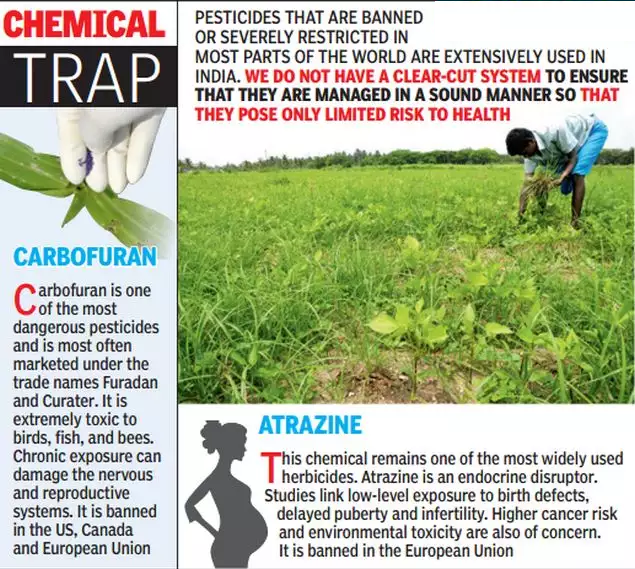- Home
- Prelims
- Mains
- Current Affairs
- Study Materials
- Test Series
 EDITORIALS & ARTICLES
EDITORIALS & ARTICLES
India should ban, not just restrict, use of dangerous weedicide glyphosate
The Ministry of Agriculture and Farmers Welfare has restricted the use of glyphosate, a widely used herbicide, citing health hazards for humans and animals.
- The new notification mandates that all certificates of registration for the chemical that companies have to get for its manufacture or sale have now to be returned to the registration committee.
- Failure to do so will result in appropriate action being taken under the Insecticides Act of 1968.
Glyphosate
-
- It is an Herbicide, developed in 1970.
- Herbicide is an agent, usually chemical, for killing or inhibiting the growth of unwanted plants, such as residential or agricultural weeds and invasive species
- Its scientific name is N-(phosphonomethyl) glycineunder the International Union of Pure and Applied Chemistry (IUPAC) system of nomenclature.
- It is an Herbicide, developed in 1970.
- Application:
- It is applied to the leaves of plants to kill weeds.
- Usage in India:
- Glyphosate was highly accepted by the tea plantersin the past two decades. It has a very good market size in the tea sector of West Bengal and Assam.
- Presently, its consumption is highest in Maharashtraas it is becoming a key herbicide in sugarcane, maize and many fruit crops.
Concerns
- Health Impacts:
- Health impacts of glyphosate range from cancer, reproductive and developmental toxicity to neurotoxicity and immunotoxicity.
- Symptoms include irritation, swelling, burning of the skin, oral and nasal discomfort, unpleasant taste and blurred vision.
- Some 35 countries have banned or restrictedthe use of glyphosate.
- These include Sri Lanka, Netherlands, France, Colombia, Canada, Israel and Argentina.
- Illegal Use:
- In India, glyphosate has been approved for use only in tea plantations and non-plantation areas accompanying the tea crop. Use of the substance anywhere else is illegal.
- However, a 2020 study by Pesticide Action Network (PAN) India on the state of glyphosate use in the country had worrying findings,glyphosate was being used in more than 20 crop fields.
- Majority of those using the weedicide were not trained for doing so and did not have the appropriate safety
- Threatens Agro Ecological nature of Farms:
- The rampant use of glyphosate in non-designated areas has severe consequences.
- Allowing continued use of glyphosate in India will contribute to widespread use of illegal herbicide tolerant crops.
- This will endanger the agroecological nature of Indian farms, apart from spreading the toxic effects to people, animals and the environment.
- Dangerous chemical
- The Government of Kerala, in a letter to the central government dated June 20, 2019, had talked about glyphosate (weedicide) being widely and indiscriminately used in paddy fields by farmers. It also referred to a Kerala agriculture university study showing higher pesticides residues in fruits and vegetables.
- It reported that earthworms exposed to glyphosate (Roundup 360) showed a sharp decline in survival rate as well as the number of earthworm cocoons. The surface casting activity of vertically burrowing earthworms almost ceased after three weeks and reproduction of soil dwellers reduced by 56 per cent within three months after herbicide application, the report also showed.
- There are long-term negative consequences for honey bee navigation, contamination of water bodies and serious health hazards, it highlighted.
- The International Agency for Research on Cancer, France classified glyphosate as ‘probably carcinogenic to humans’ in 2015. They found ‘sufficient’ evidence of causing cancer in animals as well as ‘strong’ evidence of damaging DNA.
- The chemical also has the ability to induce genetic damage and oxidative stress in cells, according to the report.
- The European Chemical Agency found glyphosate causing grave damage to eyes and toxic to aquatic organisms with long-term effect. A study by the Indian Institute of Science, Bengaluru linked glyphosate with interference in functioning of the pituitary gland.
- Glyphosate has been banned or severely restricted in more than 35 countries, according to PAN. These include Sri Lanka, Netherlands, France, Colombia, Canada, Israel and Argentina as well as six Indian states.
Restriction welcome but insufficient
- The new restriction on use of glyphosate is a welcome step forward. However, the central government has shied away from banning it completely despite a long-pending demand from civil society and activists working in India.
- The notification mentions no person shall use glyphosate except pest control operators. However, it is not clear who will be those pest control operators and what will be the modus operandi to implement this rule.
- Past ground experience has clearly shown that while glyphosate was allowed only for tea crops, it was illegally used for various crops across the country. A complete ban may serve the purpose to stop illegal use of this dangerous weedicide.










 Latest News
Latest News General Studies
General Studies